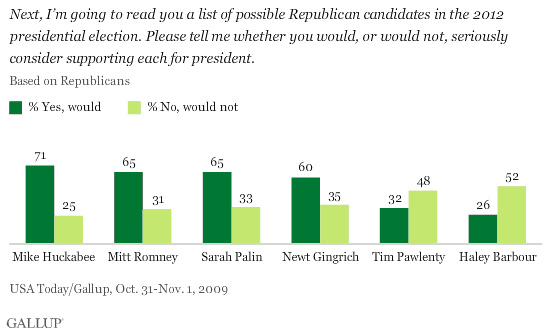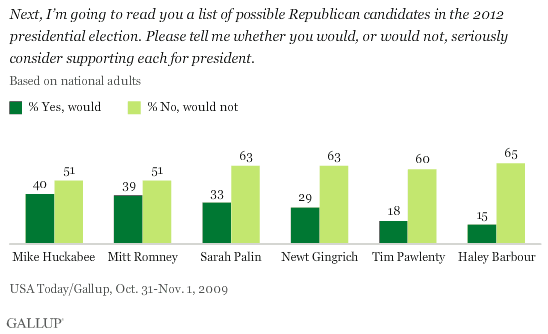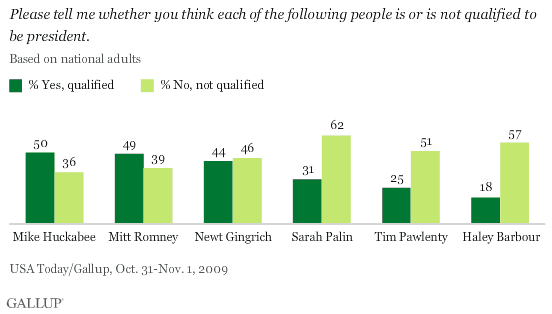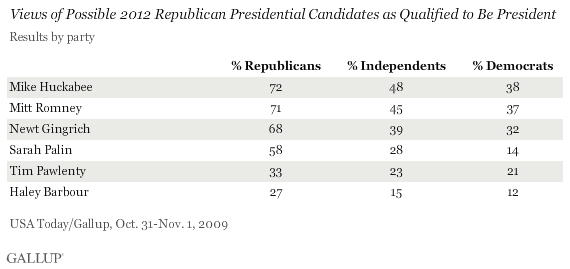PRINCETON, NJ -- Looking ahead to the 2012 presidential election, 71% of Republicans say they would seriously consider voting for Mike Huckabee. This gives Huckabee a slight edge over Mitt Romney (65%) and Sarah Palin (65%) in this early test of the strength of several potential Republican contenders. A majority of Republicans also say they would seriously consider voting for Newt Gingrich, but far fewer say they are currently ready to support the lesser-known Tim Pawlenty or Haley Barbour.

These results are based on a USA Today/Gallup poll conducted Oct. 31-Nov. 1. While this question allows respondents to express their level of support for each of the potential candidates, the three front-runners that emerge are the same as when Gallup in July asked respondents which potential candidate they were most likely to support.
"Thirty-three percent of Americans would seriously consider voting for Palin, but about the same number -- 31% -- believe she is qualified to be president."
The poll suggests that the appeal of these potential challengers to Barack Obama in 2012 at this point is primarily limited to the Republican faithful. Among all Americans, Huckabee and Romney perform better than the other Republicans tested, but only about 4 in 10 Americans say they would consider voting for either.

The overall numbers are depressed in part because no more than 20% of Democrats say they would consider voting for any of the candidates (Romney 20%, Huckabee 18%, Pawlenty 11%, and Palin 10%). Those low figures are understandable given that typically about 10% of party identifiers wind up voting for the opposition's candidate in presidential elections.
Additionally, no more than 40% of independents support any of the Republicans. Huckabee (40%) and Romney (40%) tie for the lead in potential support among independents, followed by Palin (32%) and Gingrich (28%).
In addition to gauging potential support for each candidate, the poll also asked Americans to say whether they think each is qualified to be president. Huckabee and Romney are the leaders in this respect, with about half of the public saying each is qualified.

Thus, more Americans believe Huckabee (50%) and Romney (49%) are qualified to be president than say they would seriously consider voting for them (40% and 39%, respectively). The same is true for Gingrich, although there is a wider gap between the percentage who believe he is qualified (44%) and the percentage who would seriously consider supporting him (29%).
That is not the case for Palin, however. Thirty-three percent of Americans would seriously consider voting for her, but about the same number -- 31% -- believe she is qualified to be president. In fact, Republicans are more likely to say they would seriously consider voting for Palin for president (65%) than to say she is qualified for the job (58%).
A majority of Republicans believe each of the four higher-profile candidates is qualified to be president, including 7 in 10 who say this about Huckabee, Romney, and Gingrich. But independents and Democrats are not convinced, as less than half of both party groups believe any of the Republican candidates has the proper credentials to be president.

Bottom Line
Huckabee and Romney lost their 2008 bids for the Republican presidential nomination to John McCain, but each can now, along with Palin, be considered one of the early front-runners for the 2012 GOP nomination.
Although most Republicans currently regard Romney, Huckabee, and even Gingrich as more qualified than Palin, the former Alaska governor maintains a strong appeal among Republicans. Her popularity among the party's base -- Palin's 72% favorable rating in July well exceeded those for Romney (56%) and Huckabee (59%) among Republicans -- to a large degree seems to offset any deficit she has in perceived experience.
Survey Methods
Results are based on telephone interviews with 1,021 national adults, aged 18 and older, conducted Oct. 31-Nov. 1, 2009. For results based on the total sample of national adults, one can say with 95% confidence that the maximum margin of sampling error is ±4 percentage points.
For results based on the sample of 301 Republicans, the maximum margin of error is ±7 percentage points.
For results based on the sample of 347 independents, the maximum margin of error is ±7 percentage points.
For results based on the sample of 339 Democrats, the maximum margin of error is ±7 percentage points.
Interviews are conducted with respondents on land-line telephones and cellular phones.
In addition to sampling error, question wording and practical difficulties in conducting surveys can introduce error or bias into the findings of public opinion polls.
